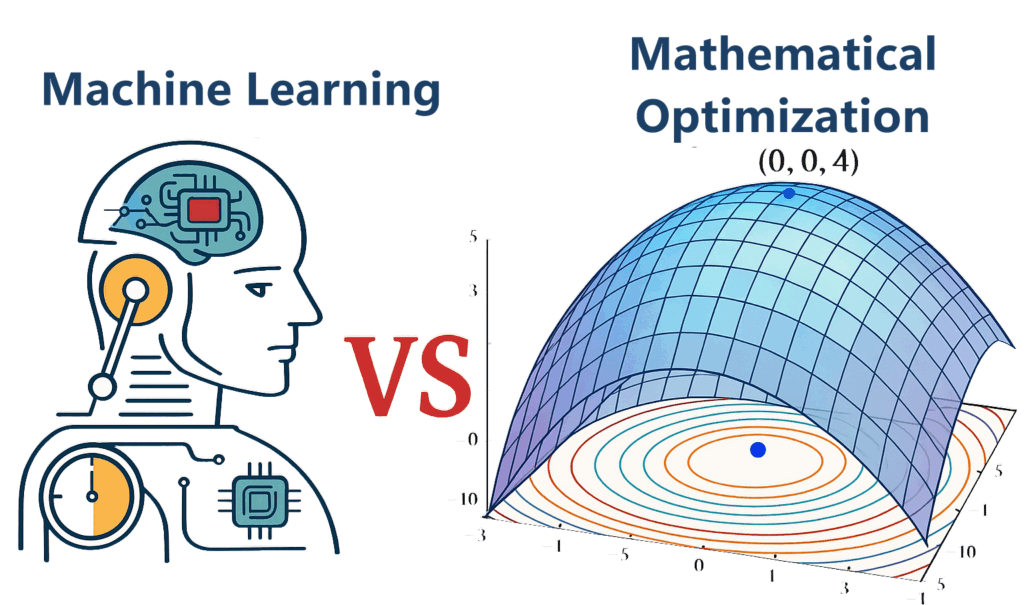AMPL Turns 40: From a Bold Language Idea to a Platform Powering Complex Decisions

As we enter the final weeks of 2025, a time of reflection and gratitude, we have something truly special to celebrate – 40 years of AMPL! Read about our interviews of reflective conversations with founders Bob Fourer, David Gay, and Brian Kernighan, joined by AMPL CEO Bill Wells and Head of Development, Filipe Brandao.
amplbot: Your reliable AI Assistant
🤖Meet amplbot: Your reliable AI Modeling Assistant Struggling to turn optimization ideas into working models? Meet amplbot— your specialized AI assistant, trained on a vast range of industry models and the full power of the AMPL modeling engine. Designed to elevate your workflow beyond generic AI, amplbot accelerates model development, debugging, and learning, while helping […]
From Excel to AMPL
From Excel to AMPL: My 10-Year Journey in Mathematical Optimization I still remember the first time I stumbled upon mathematical optimization while studying economics.It felt like unlocking a hidden superpower — here was a way to combine economics, production, energy, environmental impact, and so much more into a single decision-making model, all aimed at maximizing […]
The Future of Optimization is Shared: Introducing the AMPL Model Repository
Stop reinventing the wheel. Discover how a centralized hub for mathematical optimization models is accelerating innovation and bridging the gap between academia and industry. Introduction: The Challenge of Isolated Knowledge In the world of mathematical optimization, a common frustration unites business leaders, researchers, and modelers alike: the immense difficulty of finding the right model for […]
How the AMPL Ecosystem Helps Companies Grow
“From finance to supply chains, from energy to healthcare — today’s companies face complexity at every turn. Spreadsheets and ad-hoc tools are no longer enough. What’s needed is an ecosystem that connects data, analytics, forecasts, and optimization into decisions that drive growth. That’s exactly what the AMPL ecosystem delivers” From Requirements to Solutions Every company […]
Amplpy Best Practices
Supercharge Your Optimization with Our New AMPL & Python Guide Hello Amazing Customers! We’re pleased to share our comprehensive guide designed to help you master optimization modeling with AMPL and Python. Whether you’re fine-tuning supply chains, crunching data, or making smarter decisions, it’s your blueprint for smarter, faster, and more efficient solutions. What’s Inside? Here’s a quick […]
Official AMPL Extension for Visual Studio

We’re excited to announce the official release of the AMPL extension for Visual Studio Code is now available on the Visual Studio Marketplace! 🎉
Whether you’re modeling energy systems, optimizing supply chains, or teaching mathematical programming, this extension brings AMPL right into your favorite Python development environment.
From Patterns to Precision: Machine Learning & Mathematical Optimization for Real-World Challenges

Machine Learning (ML) and Mathematical Optimization (MO) are two powerful tools for addressing complex problems across various fields. While ML uses data to identify patterns and make predictions, MO focuses on finding the best possible solution within a defined set of constraints. Understanding their unique strengths, limitations, and synergistic potential enables effective application in problem-solving.
Breaking Barriers in Optimization: AMPL’s Early Results with NVIDIA cuOpt

In testing NVIDIA cuOpt, the results speak for themselves. | In the world of optimization, speed is everything. Whether optimizing supply chains, scheduling transportation, or tackling complex energy market decisions, the ability to solve large-scale mathematical programming problems quickly can mean the difference between an efficient operation and costly delays.
AMPL: A Specialized Optimization Language Built for Industry, Businesses, and Complex Tasks

Every business makes decisions—but not every business makes them optimally.
Optimization is the difference between guessing and knowing, between wasting resources and maximizing efficiency. It’s about finding the best possible solution to complex challenges—faster, smarter, and with real-world constraints in mind.